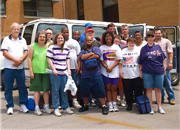What is the school counselor’s responsibility in the transition planning process?
Page 9: Referrals to Other Agencies
 The ongoing involvement of post-school services, supports, programs, and agencies during IEP transition planning is critical to the post-school success of students with disabilities. Once a student exits school, however, he or she is not automatically eligible for services and programs based on his or her disability alone but also must meet the requirements or policies of the individual agency (e.g., Social Security Income, mental health services). Without support, the student and family can easily get lost in the different services, programs, eligibility requirements, and funding streams. It is the responsibility of the school counselor or other IEP members to learn about those services, supports, and programs and to help students make those connections during the transition process. This information may be accessed through telephone hotlines or websites that offer contact information for the full range of disability-related organizations and agencies such as those listed below.
The ongoing involvement of post-school services, supports, programs, and agencies during IEP transition planning is critical to the post-school success of students with disabilities. Once a student exits school, however, he or she is not automatically eligible for services and programs based on his or her disability alone but also must meet the requirements or policies of the individual agency (e.g., Social Security Income, mental health services). Without support, the student and family can easily get lost in the different services, programs, eligibility requirements, and funding streams. It is the responsibility of the school counselor or other IEP members to learn about those services, supports, and programs and to help students make those connections during the transition process. This information may be accessed through telephone hotlines or websites that offer contact information for the full range of disability-related organizations and agencies such as those listed below.
 Recreation and Leisure Many typically-developing young adults continue with the recreational or leisure activities in which they were involved as adolescents, or pick up new interests as their lifestyles change. In contrast, youth with disabilities may need assistance to discover the recreational and leisure pursuits available to them, and may require additional help to access these activities.
Recreation and Leisure Many typically-developing young adults continue with the recreational or leisure activities in which they were involved as adolescents, or pick up new interests as their lifestyles change. In contrast, youth with disabilities may need assistance to discover the recreational and leisure pursuits available to them, and may require additional help to access these activities.
City or county recreation programs may offer activities of interest that may suit youth and young adults in transition (individual and team sports, music, dance, visual arts, etc.). In addition, many also offer adapted programs that allow wider choices of cultural, sporting, and other leisure experiences that may better support individuals with cognitive or physical needs. City, county, and state government program listings in the telephone directory or another resource directory should be found under “Parks and Recreation,” “Community Recreation Initiatives,” “Swimming Pools,” or “Youth Programs.” In addition, local agencies that provide residential living support typically build in recreation/ leisure development and experiences as an option.
Community Participation One goal for many individuals with disabilities is to access community services, supports, and programs that match their interests and goals.
Youths in transition need access to community settings such as libraries and polling places. Every community’s transportation system is a good starting point to identify any available transportation supports and accommodations. “Family and Community Services” and city/ county “Transit Departments” are two listings that may provide useful information.
Related Services Youth in transition may need to continue existing related services, such as occupational, physical, and speech and language therapies. However, unlike school-age students, adults with disabilities are not guaranteed provision of these services.
Adults with disabilities who require related services should keep several considerations in mind.
- Only certain funding sources (such as Developmental Disabilities Waiver Programs, Disabled and Elderly Waiver Programs, General Fund Waiver Programs through the Department of Health, and managed care systems in coordination with the person’s physician) are likely to pay for related services at the adult level.
- These funds are limited in some states, in which case applicants may experience years on waiting lists. Therefore, referrals to the departments offering these waivers (generally in regional offices around each state) must be made as soon as the IEP team determines these services will be essential for the young adult.
- Behavioral health supports are often in short supply at the adolescent and adult levels. Services may be provided through each state’s local agencies funded by their Department of Health Behavioral Health Programs or through private insurance plans.
- Living support programs in the community may be available for young adults with mental health diagnoses. Sometimes comprehensive programs that combine residential, educational, vocational, and behavioral health supports are available. Each linkage should be made early (at least 2 years before graduation), because these services are scarce and individual situations vary dramatically.
- Assistive technology services may be funded through or provided by the Vocational Rehabilitation agency or Commission for the Blind.
- For communication support, phone companies offer special assistance including TTY services, relay networks for those who have hearing or speech impairments, operator services, and large print or Braille materials. Phone directories typically include a list of disability-related service agencies under their “Community Service Numbers” pages, as well as the most prevalent hotlines.
Independent Living Some individuals need assistance in daily living activities (e.g., housing, cleaning, cooking, budgeting, buying groceries).
City and county housing departments offer limited slots for Section 8 Housing, a category of housing for those who meet low-income criteria. Persons with disabilities are frequently eligible for Section 8 Housing (rentals or purchases) because they are considered “families of one” for many agencies’ income criteria. Individuals with disabilities who are unable to work full-time or for more than subsistence-level wages are eligible for income support. This support can include funds for childcare, food stamps, and temporary monthly income. Each state’s Human Services Department offers “Temporary Assistance for Needy Families” (TANF) resources. Some states offer other specific programs for income support.
 Physical Health Public or private agencies that provide support in this arena are typically funded through Medicare or Medicaid eligibility and/ or the individual’s private insurance program. Community health or public health agencies may also offer services and supports for physical well-being.
Physical Health Public or private agencies that provide support in this arena are typically funded through Medicare or Medicaid eligibility and/ or the individual’s private insurance program. Community health or public health agencies may also offer services and supports for physical well-being.
Legal and Advocacy Organizations Each state has its own Protection and Advocacy (P&A) Office whose mission is to provide legal advocacy for individuals and groups with disabilities.
Services provided by P&A offices cover all areas addressed by Section 504 of the Vocational Rehabilitation Act and the Americans with Disabilities Act, such as equal access to educational, governmental, employment, and community services programs. In addition, the Bureau of Indian Affairs and Native American tribes may have their own P&A divisions to protect the rights of persons with disabilities. Non-government advocacy organizations also provide supports. These advocacy organizations include each state’s parent information clearinghouse and training organization and numerous disability-specific organizations (e.g., Learning Disabilities Association, Brain Injury Association, and the Arc).
For Your Information
Some agencies specialize in serving individuals with disabilities, while others serve the general population. This array of options is not often found in rural areas, so job seekers may have to travel to larger communities.Activity
 D.J. is an 18 year old with a moderate intellectual disability who lives in your community. He will remain in the public school setting until his twenty-second birthday. His IEP team has determined that he will require speech and language therapy services into his adult life, and support in these areas: recreation and leisure, community services, and daily living. Assess the options and supports available for D.J. in your community in one of these areas.
D.J. is an 18 year old with a moderate intellectual disability who lives in your community. He will remain in the public school setting until his twenty-second birthday. His IEP team has determined that he will require speech and language therapy services into his adult life, and support in these areas: recreation and leisure, community services, and daily living. Assess the options and supports available for D.J. in your community in one of these areas.
Transition Update – Sandra's Agency Referrals
 Sandra is 14 years old and requires no adult agency referrals at this time. Mr. Hunter realizes that as Sandra approaches her sixteenth birthday, he will need to support her by making referrals to the appropriate agencies and by getting her on the necessary waiting lists. Currently, in conjunction with her post-secondary goal to exercise regularly, Sandra has begun twice-weekly workouts at the local YWCA, which she accesses using the city bus system.
Sandra is 14 years old and requires no adult agency referrals at this time. Mr. Hunter realizes that as Sandra approaches her sixteenth birthday, he will need to support her by making referrals to the appropriate agencies and by getting her on the necessary waiting lists. Currently, in conjunction with her post-secondary goal to exercise regularly, Sandra has begun twice-weekly workouts at the local YWCA, which she accesses using the city bus system.